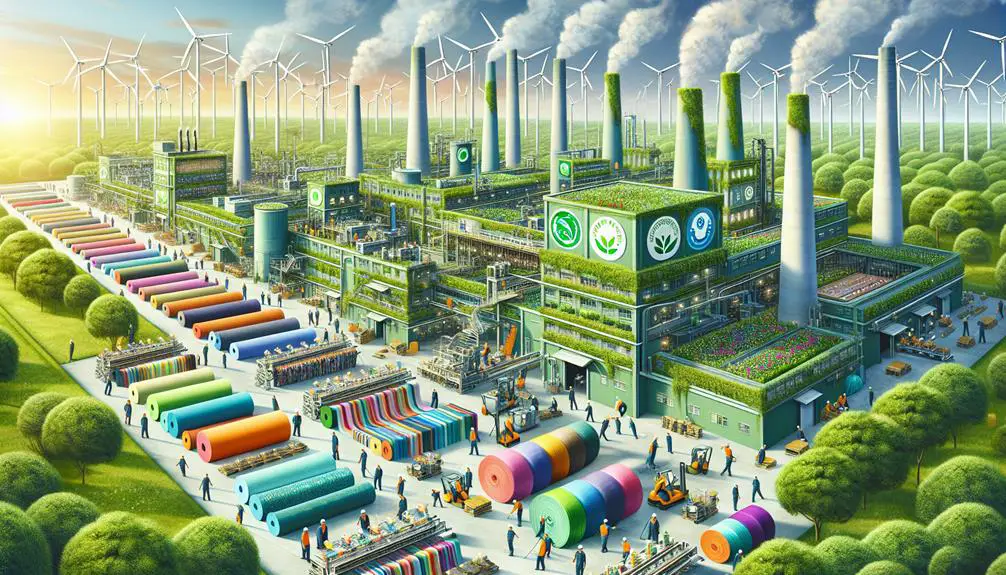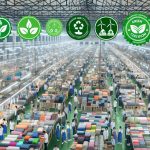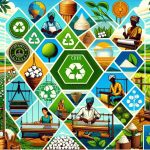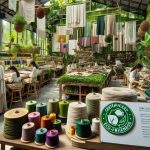When you spot the GOTS label on a piece of clothing, you're seeing a commitment to both environmental and social responsibility. Certifications like GOTS, OEKO-TEX, and Fair Trade guarantee that textiles adhere to high standards, reducing their ecological footprint and promoting ethical labor practices. But what do these certifications really mean for the industry and for you as a consumer? Understanding their impact not only helps you make informed choices but also supports sustainable practices across the textile sector. Let's explore how these certifications shape the future of textiles in more depth.
Table of Contents
Key Takeaways
- Textile certifications ensure fabrics meet strict environmental and ethical standards, promoting sustainability.
- Certifications like GOTS and OEKO-TEX guarantee safe, organic, and chemical-free textiles.
- Fair Trade and Responsible Wool standards emphasize fair labor practices and animal welfare.
- Bluesign and Cradle to Cradle certifications focus on sustainable production and lifecycle management.
- Certifications enhance consumer trust and align products with eco-conscious market demand.
Importance of Textile Certifications
Textile certifications play a pivotal role in guaranteeing that fabrics meet environmental and ethical standards. When you're selecting textiles, understanding these certifications helps you make informed decisions that align with your values. They guarantee that the production processes minimize environmental impact, reduce waste, and promote sustainable practices.
By choosing certified textiles, you're not just buying a product; you're supporting a system that prioritizes the environment. Certifications such as OEKO-TEX and Fair Trade focus on reducing harmful chemicals and supporting fair labor practices. This emphasis on environmental impact is vital for maintaining the planet's health and securing future generations have access to natural resources.
Supply chain transparency is another crucial aspect of textile certifications. You want to know where your fabrics come from and how they're made. Certifications require companies to disclose their sourcing and manufacturing processes, giving you insight into each step of the supply chain. This transparency helps you guarantee that the textiles you choose are produced ethically and sustainably, from raw material extraction to finished product.
Global Organic Textile Standard
When you see the Global Organic Textile Standard (GOTS) label, you can be confident that the fabric meets stringent environmental and social criteria. GOTS is a leading certification in the sustainable textiles industry, ensuring that every stage of production, from raw materials to finished products, adheres to rigorous standards.
To achieve GOTS certification, companies must meet criteria that address both environmental impact and social responsibility. This involves using organic fibers, restricting harmful chemicals, and implementing fair labor practices. The certification criteria are designed to minimize the environmental footprint while promoting ethical working conditions.
| GOTS Criteria | Details |
|---|---|
| Organic Fibers | Minimum of 70% organic fibers required |
| Chemical Restrictions | Prohibition of harmful substances |
| Environmental Management | Wastewater treatment mandatory |
| Social Criteria | Fair labor practices enforced |
| Traceability | Full supply chain transparency |
OEKO-TEX Standard 100
For peace of mind concerning harmful substances in textiles, look for the OEKO-TEX Standard 100 label. This certification guarantees that every component of the product, from threads to buttons, has been thoroughly tested for harmful substances. The testing requirements are extensive, covering numerous regulated and non-regulated substances that might be detrimental to human health. With OEKO-TEX Standard 100, you can be assured that the textiles you choose comply with strict international safety standards.
As a consumer, your awareness and trust are crucial. The OEKO-TEX Standard 100 label serves as a reliable indicator of product safety, allowing you to make informed purchasing decisions. By selecting textiles with this certification, you're not just buying a product; you're investing in your well-being and that of your loved ones. This label has become a trusted benchmark for consumers who prioritize health and safety in their textile choices.
Moreover, the ongoing updates to OEKO-TEX testing requirements ensure the certification remains at the forefront of textile safety. Committing to OEKO-TEX Standard 100 means you're choosing products that meet the highest standards of safety and quality, thereby fostering greater consumer trust and confidence.
Fair Trade Certified Textiles
Just as OEKO-TEX Standard 100 guarantees the safety of textiles, Fair Trade Certified Textiles focus on ethical and sustainable production practices. When you opt for Fair Trade Certified Textiles, you're not just purchasing a product; you're supporting ethical sourcing and worker empowerment. This certification safeguards that workers receive fair wages, work in safe conditions, and have access to essential benefits.
| Ethical Sourcing | Worker Empowerment | Environmental Impact |
|---|---|---|
| Fair wages | Safe conditions | Reduced pollution |
| Transparency | Access to benefits | Sustainable farming |
| No child labor | Fair trade premiums | Ethical materials |
| Community support | Skill development | Eco-friendly methods |
Fair Trade Certified Textiles make a significant positive impact on communities and the environment. By choosing these textiles, you make certain that your purchase contributes to a system that values human dignity and ecological sustainability. Ethical sourcing practices guarantee that materials are obtained responsibly, minimizing harm to both people and the planet.
Additionally, worker empowerment is a cornerstone of Fair Trade Certification. It provides workers with opportunities for skill development and community support, enhancing their quality of life. Embracing these textiles means you're fostering a fairer, more just textile industry.
Bluesign for Sustainable Production
Bluesign sets the standard for sustainable production in the textile industry by verifying that harmful substances are eliminated from the manufacturing process. You can trust Bluesign to deliver textiles that meet rigorous safety and environmental criteria. This certification focuses on minimizing environmental impact and enhancing supplier transparency, making it a cornerstone for any brand committed to sustainability.
When you choose a Bluesign-certified product, you're supporting a system that scrutinizes every step of the supply chain. From raw materials to finished goods, Bluesign verifies that each component meets high environmental standards. This means fewer pollutants in our waterways and reduced energy consumption, ultimately contributing to a healthier planet.
Transparency is another critical aspect of the Bluesign system. Suppliers undergo stringent audits to confirm compliance, providing you with a clear view of the practices behind your textiles. This level of transparency empowers you to make informed decisions, aligning your purchases with your values.
Cradle to Cradle Certification
While Bluesign emphasizes reducing harmful substances and enhancing transparency, Cradle to Cradle Certification takes a holistic approach by evaluating a product's overall lifecycle sustainability. With this certification, you're not just looking at the end product but also considering every stage from production to disposal. It's about guaranteeing that the environmental impact is minimized and that products are designed with both reuse and recycling in mind.
To achieve Cradle to Cradle Certification, a textile product must meet rigorous standards in five categories: material health, material reutilization, renewable energy and carbon management, water stewardship, and social fairness. This thorough assessment ensures that the product quality is maintained while promoting sustainability.
You'll find that products with this certification are often at the forefront of innovation, pushing boundaries to create textiles that aren't only high-quality but also environmentally responsible.
Forest Stewardship Council
The Forest Stewardship Council (FSC) certification often guarantees that the wood and paper products used in textiles come from responsibly managed forests. When you see the FSC label, you know that the forest management practices adhere to rigorous environmental, social, and economic standards. This certification can notably reduce the environmental impact of textile production by making sure that the raw materials are sourced sustainably.
You might wonder how FSC certification makes a difference. First, it guarantees that forests are managed in a way that maintains biodiversity, productivity, and ecological processes. This means that the trees harvested for your textiles are replaced or allowed to regenerate naturally, preserving the forest's health and resilience.
FSC's principles also require respecting the rights of indigenous peoples and workers, ensuring fair wages and safe working conditions.
Responsible Wool Standard
When you select wool products certified by the Responsible Wool Standard (RWS), you're endorsing animal welfare and sustainable land management practices. The RWS guarantees that wool comes from farms with a holistic respect for animal welfare and the environment. By opting for RWS-certified wool, you're participating in responsible sourcing, safeguarding that the sheep are treated humanely and their pasture lands are managed responsibly.
The RWS establishes rigorous criteria for ethical production. It mandates that sheep must be handled well, fed properly, and live in conditions that allow them to express their natural behaviors. This certification also requires farmers to manage their land in ways that protect soil health, biodiversity, and native species. The standard's comprehensive auditing process guarantees that these principles are adhered to consistently.
Selecting RWS-certified products means you're demanding transparency and accountability from wool producers. It's a commitment to ethical production where you can trace the journey of wool from farm to final product. This guarantees that the wool in your garments or home textiles meets high ethical and environmental standards. By embracing the RWS, you're fostering a more sustainable and humane wool industry.
Benefits for Consumers and Brands
By choosing certified sustainable textiles, you not only contribute to environmental preservation but also support ethical labor practices. This choice fosters consumer trust, ensuring you're investing in products that align with your values and standards.
Brands that adopt and promote certification in sustainable textiles enjoy significant advantages. Here's how:
- Enhanced Consumer Trust: When you see a certification label, you know the brand has met stringent environmental and ethical criteria. This transparency builds trust and encourages repeated purchases, fostering brand loyalty.
- Reduced Environmental Impact: By opting for certified products, you actively reduce your ecological footprint. Brands that prioritize sustainability can effectively market their lower environmental impact, attracting eco-conscious consumers and meeting market demand for green products.
- Increased Market Demand: Sustainable certifications address a growing consumer desire for responsible products. Brands can tap into this expanding market, driving sales and strengthening their position as leaders in sustainability.
Ultimately, these certifications bridge the gap between manufacturers and conscientious consumers. They provide clear, trustworthy information that empowers you to make informed choices, benefiting both the planet and the people behind the products.
Frequently Asked Questions
What Is the Process to Obtain a Textile Certification?
To obtain a textile certification, you'll start with an application process that involves meeting specific certification requirements. Confirm your materials and processes comply with the standards, then submit documentation and possibly undergo an on-site evaluation.
How Do Textile Certifications Affect Supply Chain Transparency?
Textile certifications shine a blinding light on supply chain transparency. They guarantee ethical sourcing and minimize environmental impact, boosting consumer awareness and fortifying brand reputation, making you an informed patron of sustainable practices.
Are There Certifications Specific to Certain Types of Textiles?
Yes, there are certifications specific to certain types of textiles. For organic cotton, look for certifications like GOTS. For recycled polyester, the Global Recycled Standard (GRS) guarantees the integrity of recycled materials in your textiles.
How Do Certifications Impact the Cost of Textiles?
Imagine a ripple effect; certifications often increase the cost impact of textiles initially. However, they can create higher market demand, ultimately balancing expenses and making your investment worthwhile as consumers seek quality and sustainability.
What Role Do Governments Play in Textile Certifications?
You need to understand that government involvement is essential. They provide regulatory oversight, setting standards and ensuring compliance. Without their role, textile certifications wouldn't have the same credibility or enforceability, ensuring sustainable practices are truly followed.
- Tetron Fabric for Marine Applications: Durability and Use Cases - June 18, 2025
- Tetron Fabric for Outdoor Furniture: Weather Resistance and Care - June 18, 2025
- Tetron Fabric for Wall Coverings: Style and Application Tips - June 18, 2025







